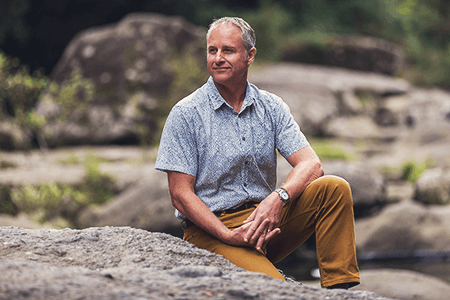The doctor breaking through the bias
By MAS Team
Northland GP and MAS Member Kyle Eggleton was shocked when he realised he was unconsciously treating patients differently depending on their ethnicity. After realising his actions, Kyle did what many wouldn't by admitting his faults and embarking on a journey of self-discovery and improvement.
It's something none of us wants to admit about ourselves – that we might harbour unconscious biases that affect how we think about other people and even how well we do our jobs.
When Northland GP Kyle Eggleton was faced with evidence of these biases during a routine self-audit, he could easily have ignored or denied it. Instead, he used the evidence as motivation to change his own behaviour and initiate what he says is a much-needed public conversation.
"Everyone has got biases of some description. When those biases are unconscious, we aren't thinking about our actions, and that is a problem. If we can become aware of them, we have the ability to reflect on our actions and attempt to change them."
Kyle's own journey of self-reflection began in 2008 when he was working in private practice. He had carried out a simple audit looking at the medication he was prescribing and breaking those numbers down by ethnicity. To his surprise, he found he was giving cholesterol-lowering medication to Pākehā patients more often than Māori patients. As uncomfortable as it was to admit, he knew this was based on an unfair belief that the former would be more likely to take the medication.
"It was very confronting. I realised that I was treating people based on assumptions that were incorrect. That was the start of my thinking about who I was as a person and where I was heading in my overall life journey and professional journey."
His first step was setting aside time to reflect on each of his consultations, asking himself a series of questions and being brutally honest about the answers.
Despite his best intentions, he still saw evidence of bias creeping in. For example, he remembers telling one patient who needed to see a specialist that they could expect to wait about six to eight months for their appointment.
"They said, 'Well, what happens if I have medical insurance?' And I hadn't even thought about this particular person having medical insurance, so I'd never asked, whereas I might have asked if they were a middle-class white person."
As well as carrying out this private reflection, Kyle began speaking publicly about his experiences, both in the media and within his field. He says he has always been met with positive responses, in part because he doesn't take an accusatory stance.
"If you confront someone, there's automatically a resistance there. So my approach has just been to say, 'Hey, look, this happened to me,' and not to say, 'You've got bias.' It's more about being a bit vulnerable and opening it up as a conversation starter."
Kyle has come to believe that interacting with a wide range of people is a crucial part of combating unconscious bias.
"If we engage with other people in a multicultural society, that will challenge our thinking, because we start seeing the person for a person rather than as part of a stereotypical group."
That's one reason why he left private practice in 2009 for a new environment with a different model of care. He joined Māori health provider Ki A Ora Ngātiwai, which is governed by members of the Ngātiwai iwi and draws its values from tikanga Māori. Kyle is the sole GP, working alongside a varied team of nurses, community support workers, Whānau Ora workers and a rheumatic fever prevention team.
Over the years, he has also thrown himself into governance roles. In 2019, he was elected to the Board of the Northland DHB, basing his campaign in part on addressing bias and equality.
Since the start of his medical career, he has seen awareness of institutional racism grow, but there's still a long way to go.
"There's a lot of talk about inequality, but the changes that are required have been very slow."
He believes work needs to be done at every level – by individual practitioners, PHOs, DHBs and national policy makers. As an example of the latter, he points to the government's bowel cancer screening programme, which is being rolled out for people aged 60 and over. The problem, Kyle says, is that bowel cancer tends to occur earlier for Māori and Pasifika people: "So that's a policy that is going to perpetuate inequity."
Meanwhile, he continues to examine his own day-to-day behaviour, believing bias is something we can never completely eradicate in ourselves.
"There are still times when I catch myself out. It's an ongoing process to constantly challenge yourself and think about where those thoughts came from. You might have a fleeting thought, just a thing that comes out of nowhere, when you glance at someone and make assumptions about the way they look or about their weight or whatever it is about them. You have to grab that thought and analyse it and say, 'That's not right.'"
A report released in May 2019 found that compared to non-Māori, Māori:
Source: Health Quality & Safety Commission. (2019). A window on the quality of Aotearoa New Zealand's health care 2019 – a view on Māori health equity.
If you're a GP, begin by looking at any audit you'd normally do, breaking that audit down by ethnicity and looking at the differences. Then, start treating each consultation as a reflective process. "You become more vigilant when you start challenging yourself more," Kyle explains.
Ask yourself:

Professionals across the country are proving that you can have creative side hustles as writers, playwrights and artists no matter what line of work you do and how busy you are. Here is Andrew's story.

Our personal connections can be more soothing than an hour of meditation so it stands to reason we should be strengthening our relationships.

Rainbow Tick is all about accepting and valuing people in the workplace, embracing the diversity of sexual and gender identities. Read more on how Repromed has show their commitment to their clients and staff by being recognised with a Rainbow Tick.